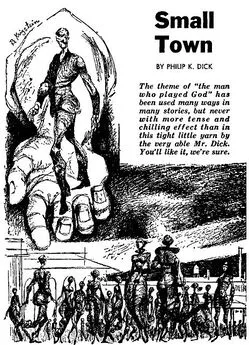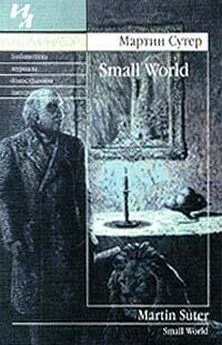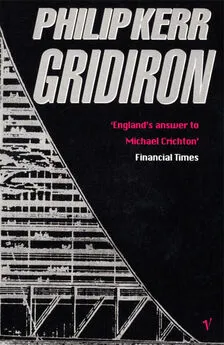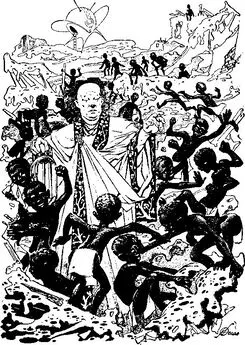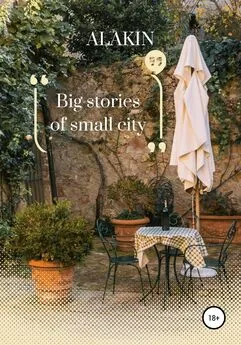Philip Dick - Small Town
- Название:Small Town
- Автор:
- Жанр:
- Издательство:неизвестно
- Год:неизвестен
- ISBN:нет данных
- Рейтинг:
- Избранное:Добавить в избранное
-
Отзывы:
-
Ваша оценка:
Philip Dick - Small Town краткое содержание
Small Town - читать онлайн бесплатно полную версию (весь текст целиком)
Интервал:
Закладка:
Madge shivered. "Let’s go upstairs where it’s warm. It’s so cold down here.”
“But as the boy grows up, he gets bigger and stronger. He can shed the model-symbol. Master the real object, the real train. Get genuine control over things. Valid mastery.” Tyler shook his head. “Not this substitute thing. Unusual, a grown person going to such lengths.” He frowned. “I never noticed a mortuary on State Street.”
“A mortuary?”
“And this. Steuben Pet Shop. Next door to the radio repair shop. There’s no pet shop there.” Tyler cudgeled his brain. “What is there? Next to the radio repair place.”
“Paris Furs.” Madge clasped her arms. “Brrrrr. Come on, Paul. Let’s go upstairs before 1 freeze.”
Tyler laughed. “Okay, sissy.” He headed toward the stairs, frowning again. “I wonder why. Steuben Pets. Never heard of it. Everything is so detailed. He must know the town by heart. To put a shop there that isn’t—” He clicked off the basement light. “And the mortuary. What’s supposed to be there? Isn’t the—”
“Forget it,” Madge called back, hurrying past him, into the warm living room.
"You’re practically as bad as he is. Men are such children."
Tyler didn’t respond. He was deep in thought. His suave confidence was gone; he looked nervous and shaken.
Madge pulled the Venetian blinds down. The living room sank into amber gloom. She flopped down on the couch and pulled Tyler down beside her .“Stop looking like that,” she ordered. “I’ve never seen you this way.” Her slim arms circled his neck and her lips brushed close to his ear. “I wouldn’t have let you in if I thought you were going toworry about him”
Tyler grunted, preoccupied. “Why did you let me in?” The pressure of Madge’s arms increased. Her silk pajamas rustled as she moved against him. “Silly,” she said.
Big red-headed Jim Larson gaped in disbelief. “What do you mean? What’s the matter with you?”
“I’m quitting.” Haskel shoveled the contents of his desk into his briefcase. “Mail the check to my house.” “But—”
“Get out of the way." Haskel pushed past Larson, out into the hall. Larson was stunned with amazement. There was a fixed expression on Haskel’s face. A glazed look. A rigid look Larson had never seen before.
“Are you—all right?” Larson asked.
“Sure.” Haskel opened the front door of the plant and disappeared outside. The door slammed after him. “Sure I’m all right,” he muttered to himself. He made his way through the crowds of late-afternoon shoppers, his lips twitching. “You damn right I'm all right.”
“Watch it, buddy,” a laborer muttered ominously, as Haskel shoved past him.
“Sorry.” Haskel hurried on, gripping his briefcase. At the top of the hill he paused a moment to get his breath. Behind him was Larson’s Pump and Valve Works. Haskel laughed shrilly. Twenty years — cut short in a second. It was over. No more Larson. No more dull, grinding job, day after day. Without promotion or future. Routine and boredom, months on end. It was over and done for. A new life was beginning.
He hurried on. The sun was setting. Cars streaked by him, businessmen going home from work. Tomorrow they would be going back—but not him. Not ever again.
He reached his own street. Ed Tildon’s house rose up, a great stately structure of concrete and glass Tildon’s dog came rushing out to bark. Haskel hastened past. Tildon’s dog. He laughed wildly.
"Better keep away!” he shouted at the dog.
He reached his own house and leaped up the front steps two at a time. He tore the door open. The living room was dark and silent. There was a sudden stir of motion. Shapes untangling themselves, getting quickly up from the couch.
“Verne!” Madge gasped. “What are you doing home so early?”
Verne Haskel threw his briefcase down and dropped his hat and coat over a chair. His lined face was twisted with emotion, pulled out of shape by violent inner forces.
“What in the world!” Madge fluttered, hurrying toward him nervously, smoothing down her lounge pajamas. “Has something happened? I didn’t expect you so—” She broke off, blushing. “I mean, I—”
Paul Tyler strolled leisurely toward Haskel. “Hi there, Verne,” he murmured, embarrassed. “Dropped by to say hello and return a book to your wife.”
Haskel nodded curtly. “Afternoon.” He turned and headed toward the basement door, ignoring the two of them. “I’ll be downstairs.” “But Verne!” Madge protested. “What’s happened?” Verne halted briefly at the door. “I quit my job.”
“You what?”
“I quit my job. I finished Larson off. There won’t be anymore of him.” The basement door slammed.
“Good Lord!” Madge shrieked, clutching at Tyler hysterically. “He’s gone out of his mind!”
Down in the basement, Verne Haskel snapped on the light impatiently. He put on his engineer’s cap and pulled his stool up beside the great plywood table.
What next?
Morris Home Furnishings. The big plush store. Where the clerks all looked down their noses at him.
He rubbed his hands gleefully. No more of them. No more snooty clerks, lifting their eyebrows when he came in. Only hair and bow ties and folded handkerchiefs.
He removed the model of Morris Home Furnishings and disassembled it. He worked feverishly, with frantic haste. Now that he had really begun he wasted no time. A moment later he was glueing two small buildings in its place. Ritz
Shoeshine. Pete’s Bowling Alley.
Haskel giggled excitedly. Fitting extinction for the luxurious, exclusive furniture store. A shoeshine parlor and a bowling alley. Just what it deserved.
The California State Bank. He had always hated the Bank. They had once refused him a loan. He pulled the Bank loose.
Ed Tildon’s mansion. His damn dog. The dog had bit him on the ankle, one afternoon. He ripped the model off. His head spun. He could do anything.
Harrison Appliance. They had sold him a bum radio. Off came Harrison Appliance.
Joe’s Cigar and Smoke Shop. Joe had given him a lead quarter in May, 1949. Off came Joe’s.
The Ink Works. He loathed the smell of ink. Maybe a bread factory, instead. He loved baking bread. Off came the Ink Works.
Elm Street was too dark at night. A couple of times he had stumbled. A few more streetlights were in order.
Not enough bars along High Street. Too many dress shops and expensive hat and fur shops and ladies’ apparel. He ripped a whole handful loose and carried them to the workbench.
At the top of the stairs the door opened slowly. Madge peered down, pale and frightened. “Verne?”
He scowled up impatiently. “What do you want?”
Madge came downstairs hesitantly. Behind her Doctor Tyler followed, suave and handsome in his gray suit. “Verne — is everything all right?”
“Of course.”
“Did—did you really quit your job?”
Haskel nodded. He began to disassemble the Ink Works, ignoring his wife and Doctor Tyler.
“But why?”
Haskel grunted impatiently. “No time.”
Doctor Tyler had begun to look worried. “Do I understand you’re too busy for your job?”
“That’s right.”
“Too busy doing what?” Tyler’s voice rose; he was trembling nervously. “Working down here on this town of yours? Changing things?” “Go away,” Haskel muttered. His deft hands were assembling a lovely little Langendorf Bread Factory. He shaped it with loving care, sprayed it with white paint, brushed a gravel walk and shrubs in front of it. He put it aside and began on a park. A big green park. Woodland had always needed a park. It would go in place of the State Street Hotel.
Tyler pulled Madge away from the table, off in a corner of the basement. “Good God.” He lit a cigarette shakily. The cigarette flipped out of his hands and rolled away. He ignored it and fumbled for another. “You see? You see what he’s doing?”
Madge shook her head mutely. “What is it? I don’t—”
“How long has he been working on this? All his life?”
Madge nodded, white-faced. “Yes, all his life.”
Tyler’s features twisted. “My God, Madge. It’s enough to drive you out of your mind. I can hardly believe it. We’ve got to do something."
“What's happening?” Madge moaned. “What—” “He’s losing himself into it.” Tyler’s face was a mask of incredulous disbelief. “Faster and faster.”
“He’s always come down here,” Madge faltered. “It’s nothing new. He’s always wanted to get away.”
“Yes. Get away." Tyler shuddered, clenched his fists and pulled himself together. He advanced across the basement and stopped by Verne Haskel.
“What do you want?" Haskel muttered, noticing him.
Tyler licked his lips. “You’re adding some things, aren’t you? New buildings.” Haskel nodded.
Tyler touched the little bread factory with shaking fingers. "What’s this? Bread? Where does it go?” He moved around the table. “I don’t remember any bread factory in Woodland.” He whirled. “You aren’t by any chance improving 011 the town? Fixing it up here and there?”
"Get the hell out of here,” Haskel said, with ominous calm. "Both of you.”
“Verne!” Madge squeaked. “I’ve got a lot to do. You can bring sandwiches down about eleven. I hope to finish sometime tonight.”
“Finish?” Tyler asked. “Finish,” Haskel answered, returning to his work.
“Come on, Madge.” Tyler grabbed her and pulled her to the stairs. “Let’s get out of here.” He strode ahead of her, up to the stairs and into the hall. “Come on!” As soon as she was up he closed the door tightly after them.
Madge dabbed at her eyes hysterically. “He's gone crazy, Paul! What’ll we do?”
Tyler was deep in thought. “Be quiet. I have to think this out.” He paced back and forth, a hard scowl on his features. “I’ll come soon. It won’t be long, not at this rate. Sometime tonight.”
“What? What do you mean?”
“His withdrawal. Into his substitute world. The improved model he controls. Where he can get away.”
“Isn’t there something we can do?”
“Do?” Tyler smiled faintly. "Do we want to do something?”
Madge gasped. “But we can’t just—”
“Maybe this will solve our problem. This may be what we’ve been looking for.” Tyler eyed Mrs. Haskel thoughtfully. “This may be just the thing.”
It was after midnight, almost two o'clock in the morning, when he began to get things into final shape. He was tired—but alert. Things were happening fast. The job was almost done.
Virtually perfect.
He halted work a moment, surveying what he had accomplished. The town had been radically changed. About ten o'clock he had begun basic structural alterations in the lay-out of the streets. He had removed most of the public buildings, the civic center and the sprawling business district around it.
He had erected a new city hall, police station, and an immense park with fountains and indirect lighting. He had cleared the slum area, the old run-down stores and houses and streets. The streets were wider and well-lit. The houses were now small and clean. The stores modern and attractive—without being ostentatious.
All advertising signs had been removed. Most of the filling stations were gone. The immense factory area was gone, too. Rolling countryside took its place. Trees and hills and green grass.
The wealthy district had been altered. There were now only a few of the mansions left—belonging to persons he looked favorably on. The rest had been cut down, turned into uniform two-bedroom dwellings, one story, with a single garage each.
Читать дальшеИнтервал:
Закладка:
